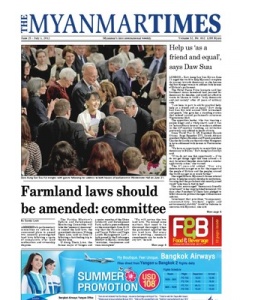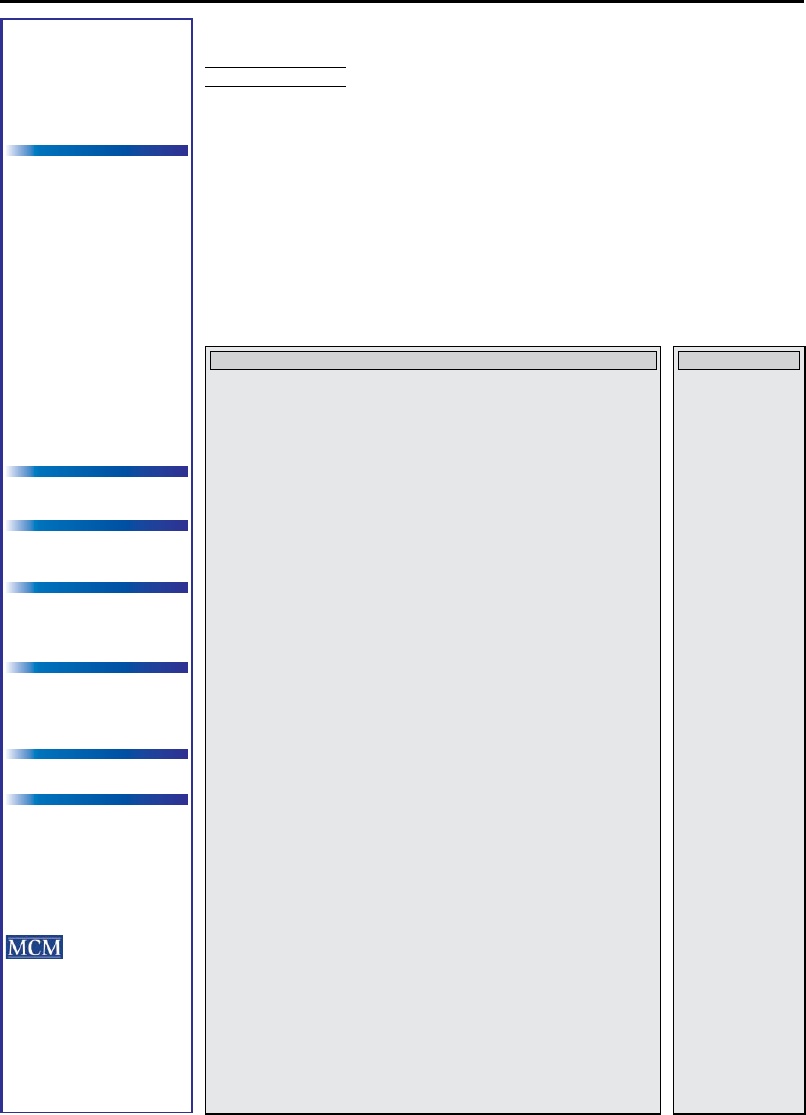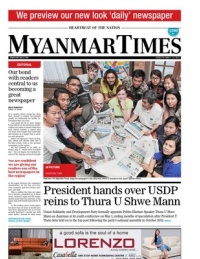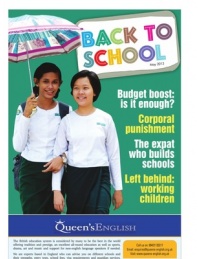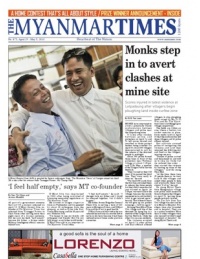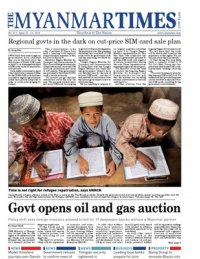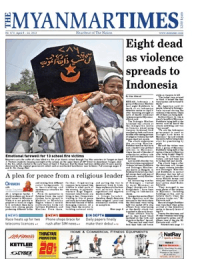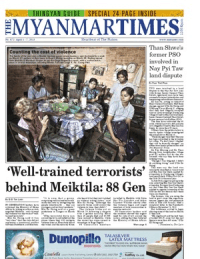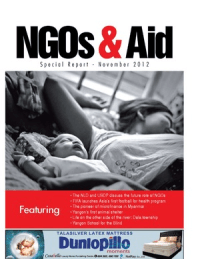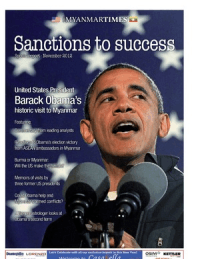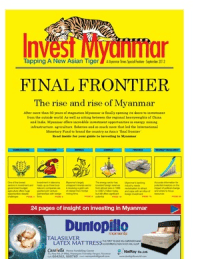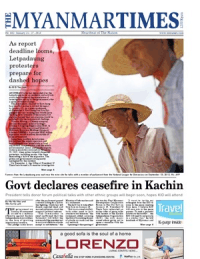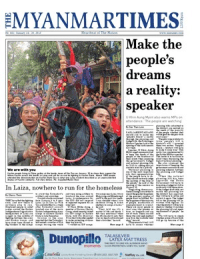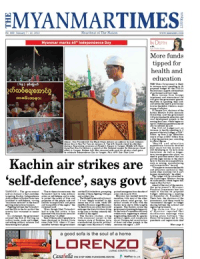myanmar
times
t H e
June 25 - July 1, 2012
Myanmar’s first international weekly Volume 32, No. 632 1200 Kyats
LONDON – Daw Aung San Suu Kyi on June21 urged the world to help Myanmar completeits journey towards democracy as she becamethe first foreign woman to address both housesof Britain’s parliament.The Nobel Peace Prize laureate said herSoutheast Asian homeland had yearned fordemocracy for decades, and could not afford towaste its chance to build a “truly democraticand just society” after 49 years of militaryrule.“I am here, in part, to ask for practical help:help as a friend and an equal,” Daw AungSan Suu Kyi told around 2000 lawmakersand guests, who gave her a standing ovationthat echoed around parliament’s cavernousWestminster Hall.The opposition leader, who was wearing apurple longyi and a white shawl, said it wasan “extraordinary honour” to make an addressin the 11
th
-century building, an invitationpreviously only offered to heads of state.Since World War II, US President BarackObama, Pope Benedict XVI, South Africanpresident Nelson Mandela and French presidentCharles de Gaulle are the only other foreignersto have addressed both houses in WestminsterHall.“We have an opportunity to re-establish truedemocracy in Burma,” Daw Aung San Suu Kyisaid.“If we do not use this opportunity – if wedo not get things right this time around – itmay be several decades more before a similaropportunity arises,” she warned.The 67-year-old added: “Our owndetermination can get us so far; the support of the people of Britain and the peoples aroundthe world can get us so much further.”She urged Britain, Myanmar’s former colonialpower, to help her country develop its institutions,warning that the parliament she recently joinedwould “take time to find its feet”.She also encouraged “democracy-friendlyinvestment” in her impoverished homeland, twodays after President U Thein Sein pledged tofollow dramatic political changes with economicreforms.Investment that prioritises “transparency,accountability, workers’ rights andenvironmental stability” would be welcome inresource-rich Myanmar, she said.
Help us ‘as afriend and equal’,says Daw Suu
Farmland laws shouldbe amended: committee
More page 4By Sandar Lwin
A MEMBER of a parliamentarycommittee on reform hasannounced plans to amendtwo recently promulgatedland laws following a spateof complaints over landconfiscation and ownershipdisputes.The Pyithu Hluttaw’sReform and DevelopmentMonitoring Committee willtake the “necessary measures”to amend the land laws, thecommittee’s chairman, U AungThein Linn, said on June 21following a fact-finding trip tothe dry zone.U Aung Thein Linn, theformer mayor of Yangon anda senior member of the UnionSolidarity and DevelopmentParty, said at a press conferenceon the committee’s June 16-20trip that the Farmland Lawand Vacant, Fallow and VirginLands Management Law –both passed by the PyidaungsuHluttaw in March – contained“mistakes, weaknesses andwere incomplete”.“We will revise the twoland laws. We missed somematters that need to bediscussed thoroughly whenthe parliament approved thetwo land laws. But everylaw is evolving – necessaryamendments can be made toany law,” he said.
More page 4Daw Aung San Suu Kyi mingles with guests following her address to both houses of parliament in Westminster Hall on June 21.
Pic: AFP
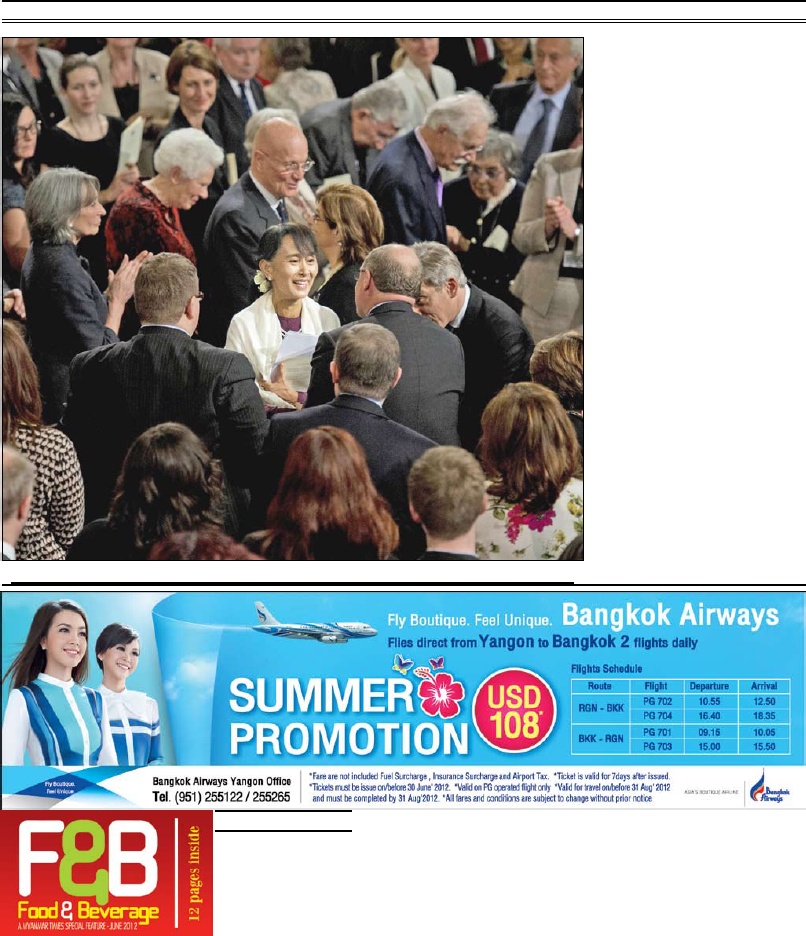



N
ews
the
M
yanMar
t
iMes
2
June 25 - July 1, 2012
SUDDENLY there is talkof more violent unrest inBangkok.People who should knowbetter are, if not openlyencouraging, then at leastseeking to justify, a militarycoup.They are not wild hotheadsor closet fascists, but aclique of affluent, educatedbusinessmen, journalists, evenopposition parliamentarians.People like the DemocratParty leaders Abhisit Vejjajiva,Suthep Thaugsuban and KornChatikavannij, who recentlyencouraged MPs to violentlybreak up parliament.They have boasted, quiteopenly and forcefully, that inorder to get their way theywill take the fight into thestreets. Along with their proxy gangof rent-a-mob goons, the sicklymisnamed People’s Alliancefor Democracy and its elitistbackers, they will stop atnothing to bring down thecurrent elected government. As Voranai Vanijaka, no fanof this government, lamentedin the
Bangkok Post
, they show“a willingness to discard thedemocratic process and usethug-like intimidation andviolence”.It is shameful and beneathcontempt, and causes somuch anger to well up that adigression is needed in orderto stay calm.So let me detour toWashington, where one of myperks as bureau chief for theSingapore
Straits Times
wasto indulge in the daily lunchesmy secretary Maria arrangedfor me in the capital’s bestrestaurants. Armed with the long list of names I gave her, she wouldbegin calling them and oncethey’d agreed on a date, shewould book a table at the OldEbbitt Grill, or the Tabard Inn,or the Monocle or the Palm.My job was onerous andstressful and I worked my socksoff from seven in the morningtill eight or nine in the evening.For more than three years,there was never a day I did notgo into the office.So I viewed my lavishexpense-account lunches as just compensation and theybecame an essential quotidian– and a highly enjoyable one,too.Some of the people I dinedwith were very clued in,especially those from the WhiteHouse or the departments of State or Defence, althoughthey did not always, of course, relay much of theirinformation.Others thankfully did. Andthen there was a third bunchwho, though they believedthey’d got all the latest dopeand would talk up a storm,rarely emitted any real freshtidings.However, these folks usuallymade up for it with their gayvolubility and extravagantlymischievous gossip.Husain Haqqani fell intothis category.Having first met him adecade earlier in Singapore,it was a joy to rekindle ourfriendship and exchangescuttlebutt, which we did atthe best Asian eateries, likeKopi Tiam, Thai Kingdom andthe Bombay Club. A former journalist fromPakistan, Husain was by thena professor of InternationalRelations at Boston Universityand a visiting scholarat Washington’s CarnegieEndowment for InternationalPeace.He was close to the Bhuttoclan, particularly the late PMBenazir, and so his opinionof her nemesis, the country’sthen dictator, General PervezMusharraf, veered betweencontempt and ridicule.They are the same feelingswe should have towards thosetrying to usurp democracy inThailand and place anothercrackpot general in power.Someone like Musharraf,who, later forced into exile overhis role in Benazir’s murder,was an unmitigated disaster,as indeed are all militarydictators, whether Pakistani,Indonesian, Filipino or Thai.Husain went on to becomePakistan’s ambassador inWashington but last Novemberhe was sacked after beingaccused of instigating a pleafor US intervention to preventanother military coup inPakistan.He denies this, but at thesame time says that whoeverwas responsible did nowrong.He is right. Any action toprevent a military takeoveris right. And those implicitlysuggesting that anothercoup would be a good ideain Thailand need to back off pronto and start to rememberan old, but apt adage.Be careful what you wish for;it may be granted.
Thai construction workers on a highrise building in Bangkok.
Pic: AFP
Inviting trouble in Thailand
The Mail Box
Got something to say? We want to hear romyou. Address all correspondence to the Editor,
The Myanmar Times
(English). We endeavourto respond to all correspondence in a timelymanner.Address: 379-383, Bo Aung Kyaw Street,Kyauktada township, Yangon. Telephone: (+951) 392-928, 253-642Fax: (+951) 392-706Email: your.myanmar.times@gmail.com
Dear editor,I refer to Asia Focus In Depth with RogerMitton article on page seven of the Monday,June 18 edition of
The Myanmar Times
.First, I want to freely admit that I admire“The Lady”, Daw Aung San Suu Kyi, verymuch. Not only because we went to the samehigh school – the former Methodist EnglishHigh School, Rangoon – where she was sixyears my senior. When I listened to thelong overdue Nobel Peace Prize acceptancespeech she delivered at the Town Hall inOslo, I had tears in my eyes. I was so veryproud to be a fellow Myanmar citizen.However, in a democratic society, towhich I think all of us here in Myanmaraspire to live in, it is the right of all of thepeople to question our leaders, to be criticaland also advise or suggest as we see fit. Weare suffering needlessly today in Myanmarbecause from 1962 to almost the presentday most were flatterers and “yes men” whodared not even lift their eyes to the highestauthority of the land! Some of the samepeople ended up in various political partiestoday, including the National League forDemocracy and National Unity Party.We need more able, effective and reliableadvisers who have the guts to say no or offerother options, solutions and alternatives asand when required.I wish and pray that both President UThein Sein and Daw Aung San Suu Kyimay have many, many more healthy andfruitful years working closely together.BBS U Win Tin,Kamaryut, YangonDear editor,It was deplorable to read the news in your journal on June 11 under the headlineof “Team appointed to probe killings”,which mentioned the barbaric incidentsin Rakhine State. I felt comfort thoughwhen the government announced that a16-member committee had been formedto investigate the cause of the incidents,identify the offenders and leaders andtake legal action. It is pleasing to see thegovernment’s prompt action to form aninvestigation committee and declare a stateof emergency in Rakhine State in order torestore peace, stability and the rule of lawin the region.Now is the time to light a candle ratherthan curse the darkness. We have to lighttomorrow with our actions today. It ishigh time that the Myanmar people – allthe citizens of Myanmar – are educated inconformity with democratic practices aboutreligious tolerance and union spirit.In order to avoid such incidents inthe future, it is also high time to enact alaw in line with section 364 of the 2008constitution, which states: “The abuse of religion for political purposes is forbidden.Moreover, any act which is intended or islikely to promote feelings of hatred, enmityor discord between racial or religiouscommunities or sects is contrary to thisConstitution. A law may be promulgatedto punish such activity.” If a law regardingall citizens of Myanmar is to be enacted,it should be thoroughly discussed withan exchange of views and opinions notonly in the Pyidaungsu Hluttaw but alsoamong the wider public. All ethnic groups,religious organisations, political parties,media and people from all walks of lifeshould participate in the discussions.I am confident that it will be an importantstep towards national reconciliation on thebasis of understanding, trust and equality.It is my earnest hope and fervent prayerthat we can build a prosperous democraticnation together in unity.Khin Maung Cho, Advocate, Yangon
A
siA
F
ocus
I
nsIde
C
over
with
Roger Mitton
‘
Along with the sickly misnamed People’sAlliance or Democracy and its elitistbackers, Democrat Party leaders will stopat nothing to bring down the government.
’
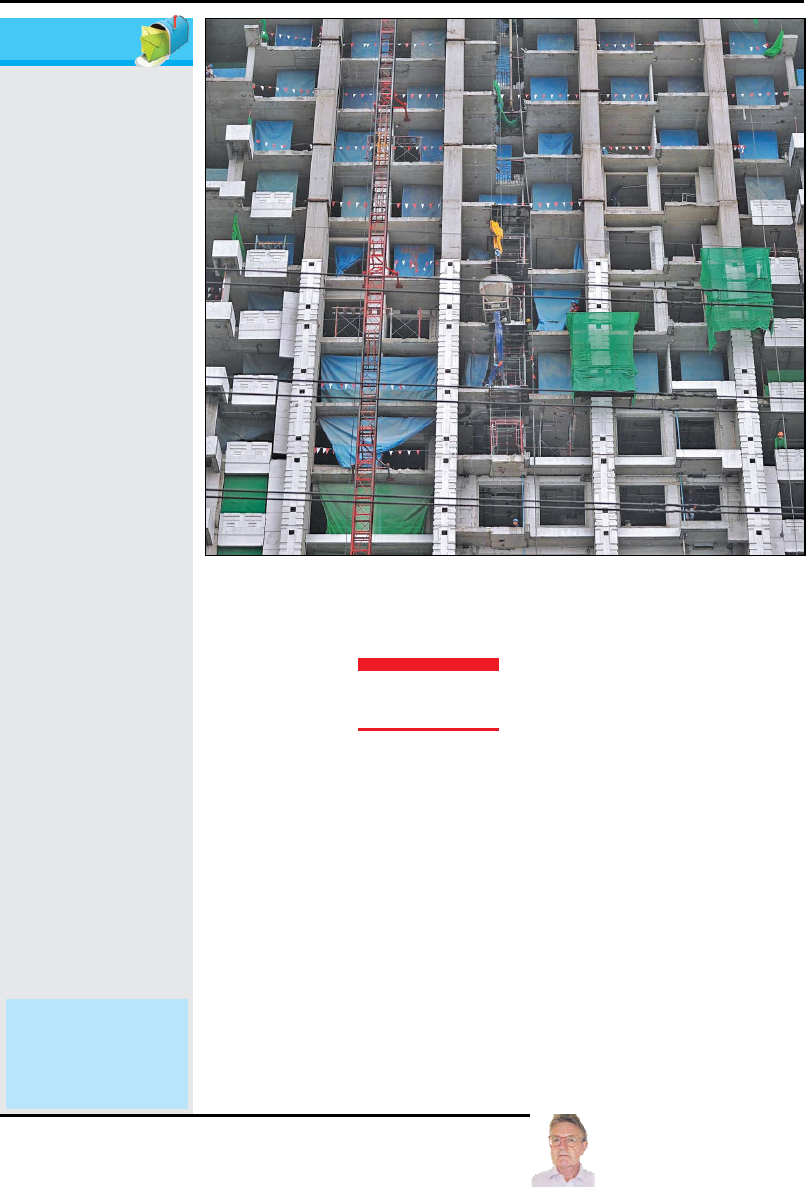



N
ews
3
the
M
yanMar
t
iMes
June 25 - July 1, 2012
By Zaw Win Than
MYANMAR has beenupgraded to Tier Two statuson the United States’ 2012Trafficking in PersonsReport, US Secretary of States Hillary Clintonannounced last week.“This upgrade recognisesthat the government of Burma is ‘making significantefforts’ for the elimination of trafficking,” Ms Clinton,who visited Myanmar inDecember 2011, said ina statement released onJune 19.It is the first time Myanmarhas been upgraded from TierThree status – the lowest of four designations – sincethe report was introducedin 2000.The US State Departmentclassifies countries as TierThree if their governmentsdo not fully comply withthe minimum standardson human trafficking andare not making significantefforts to remedy theproblem.Myanmar officials have inthe past criticised the US fornot recognising its efforts tocombat human trafficking,In December 2009, thehead of the MyanmarPolice Force’s Department Against TransnationalCrime said the governmentwas “disappointed theUS continuously placesMyanmar in the third tierin its Annual Trafficking inPersons report”.“We are somewhatdiscouraged, as we feel thatour efforts, the governmentand also the effort of UNagencies and internationalorganisations, have notbeen well acknowledged,”Police Colonel Sit Aye – nowa presidential adviser forlegal affairs – said at thetime.In her statement lastweek, Ms Clinton said thegovernment had madesignificant efforts toaddress several areas of concern, including cross-border sex trafficking of women and girls. It hadalso inaugurated a nationalhotline to respond to publiccomplaints of trafficking,repealed antiquated lawsthat sanctioned the useof forced labour, enactednew legislation that clearlyprohibits forced labour, andembarked on an ambitiousnew plan of action withthe International LaborOrganisation to eradicateforced labour by 2015, shesaid.Nevertheless, Ms Clintonsaid forced labour and therecruitment of child soldiersby both military officials andprivate entities remainedserious problems.The full report can be readonline at http://www.state.gov/j/tip, while a Myanmar-language translation of thereport will be posted on thewebsite of the US embassyin Yangon “within the nextmonth”, the embassy saidlast week.
US praisesgovt stepsto fighttrafficking
By Ei Ei Toe Lwin
EXPERTS have welcomedthe president’s ambitiousplan for economic growth butwarned that gross domesticproduct growth targets maybe overambitious.In a speech to seniorgovernment officials anddepartmental heads onJune 19, President U TheinSein said the governmentprojected a 7.7 percentaverage GDP growth to2015-16, and a 170pc risein per capita GDP overthe same period based on2010-11 figures. However,he added that its “aspiredgoal” was to triple per capitaGDP by 2016.The targets would be metby limiting or eliminatingnational budget deficits,receiving more aid, grantsand loans from abroad,and a “robust increase” ininvestment from foreign andlocal firms.“Although we haveprojected a 1.7-fold percapita GDP increase in thefiscal 2015-16 based on GDPgrowth rate calculations,our aspired goal is a tripleincrease in per capita GDP.Especially we will striveto fulfill the basic needs of our people to witness a realincome growth,” PresidentU Thein Sein said.“We will see increasein job opportunities andincome and a triple growthas projected only if wedouble our current volumeof financial investments,”President U Thein Seinsaid.The government will“soon” submit a NationalPlan bill to the PyidaungsuHluttaw, he added.He said the budget for2011-12 included a deficit of K2.159 billion and this wasforecast to decline to aboutK1.954 billion in 2012-13.The government plannedto “trim down uneconomicaland redundant enterprisesand cut expenses, whileshrinking the state-owned business sector andencouraging privatisation”in a range of sectors,including communication,electricity, energy, forestry,education, health andfinance, he said.This would be donethrough a reformedPrivatisation Commissionand “doesn’t mean a bigsell-off of government-runbusinesses”, the presidentsaid. Additionally, eachministry had been instructedto adopt and implementa “reform strategy todetermine exactly whichfunctions of its sectors andbusinesses need reforms”.The president also saidthe new Foreign InvestmentLaw would “soon” beapproved by the parliament,while a Minimum Wage Lawwould be submitted. Thenext Pyidaungsu Hluttawsession is scheduled to beginJuly 4.Most observers said theywelcomed the boldness andintent of the president’splan.“I was very pleased whenI heard the word ‘GDP’from the president,” saidDr Aung Tun Thet, a senioradvisor to the UN ResidentCoordinator and member of the National Economic andSocial Advisory Council,which was established lastmonth.“It is very important thatthe government has a visionand target for GDP [growth]to implement through acountry developmentprogram,” he said.“Some people doubtwhether [the figures] arepossible or not. I believe thatit can happen if we do [public-private partnerships]. WhenSingapore’s former primeminister, Goh Chok Tong,visited, he said he believedMyanmar could see GDPgrowth of 17pc. So, I thinkit is not difficult to meetthis target but we need todiscuss the methods we canuse to drive growth.”U Myat Thin Aung, aleading member of thebusiness community, saidthe wide-ranging speechwas “very good”.“But in the case of GDP[growth targets], he saidthe government aimed totriple per capita GDP infive years. It is possible intheory, but I think it will beextremely difficult to meetthis target,” he said.“But it can be possible withincreased foreign investmentand job opportunities,stable commodity pricesand political situation, andgood weather conditions.We also need to promoteeducation and health …and really implement cleangovernment to eradicatebribery.”One source close to thepresident said the intentionof the speech was partly to“push” ministries that havebeen struggling to adjust tohis reform plans.“We’re in a transitionperiod and although thepresident urged them tocarry out reform with abottom-up system, someministries have notcaught up because theyare sticking to the old top-down structure. Therefore,the president said to triple[per capita] GDP as a wayto push these ministries,”he said.The figures contrast withestimates made by theInternational MonetaryFund in May following its Article IV Consultation. TheIMF said real GDP growthis estimated to have been5.3pc in 2010-11 but wasprojected to increase to5.5pc in 2011-12 and 6pc in2012-13.Mr Sean Turnell, an experton the Myanmar economyfrom Australia’s MacquarieUniversity, said the figureswere “ambitious to the pointof being unachievable”.Meeting either the projectedor aspirational targetswould require growthrates “unprecedentedhistorically”, even inChina.
President U Thein Sein delivers a speech at thePyidaungsu Hluttaw on March 1.
Pic: AFP
GDP growth goals spark debate
Achieving projected rates would require ‘historically unprecedented’ levels o growth, say experts
More page 4


検索履歴:
結果00中00
00結果次の結果
p.
Notes
Post Note
